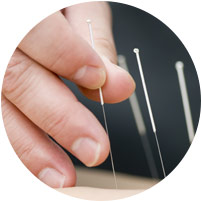 Chinese Medicine is described as a system of primary health care now recognized by the World Health Organization (WHO) as an effective treatment for many different disorders. Chinese Medicine includes acupuncture, electro acupuncture, laser acupuncture, infrared heat therapy, auriculotherapy, Chinese herbal medicine, moxa, cupping, remedial massage (tuina), exercise and breathing therapy (such as qigong) as well as diet and lifestyle advice.
Chinese Medicine is described as a system of primary health care now recognized by the World Health Organization (WHO) as an effective treatment for many different disorders. Chinese Medicine includes acupuncture, electro acupuncture, laser acupuncture, infrared heat therapy, auriculotherapy, Chinese herbal medicine, moxa, cupping, remedial massage (tuina), exercise and breathing therapy (such as qigong) as well as diet and lifestyle advice.
The core of Chinese medicine is to ensure Qi (pronounced chee) is maintained and flows freely through the body. Qi promotes and activates all the physiological activities in the body and through the physiological activities of organs and meridians, the movements of qi can be manifested correctly (Xue 2011, p.19).
Thus an inadequate supply of qi due to blockages in the body or deficiencies of internal organs is the leading cause of disease or imbalances in the body according to Chinese medicine. For your chinese medicine practitioner to detect these blockages, deficiencies or imbalances in the body we will assess your health by paying particular attention to the presenting condition, medical history, pathology, diet, observing the tongue and color of the person and palpating the meridians/organs and pulse to diagnose and treat the disharmony.
Once a Chinese Medicine diagnosis is made a treatment protocol combining Acupuncture, nutritional and herbal medicine is prescribed to restore Qi thereby regulating hormones, the nervous system, Muskoskeltal system, inflammation and pain. Your treatment will focus on treating the symptoms along with the underlying condition over a number of treatments to harmonise the body and mind.
Western Medicine Perspective on Chinese Medicine
Western Medicine Perspective on Chinese Medicine
Western Medicine is a young medicine compared to Chinese Medicine and views acupuncture as the insertion of needles at specific points for therapeutic purposes. From a western perspective meridians can be described as linkages of muscles, an electromagnetic field and the synthesis of several systems including nervous, lymphatic and cardiovascular systems (Kubiena and Sommer 2010).
Acupuncture research from the view point of western medicine has shown some of the following effects:
- Analgesic effect on central and peripheral nervous system, thus reducing pain
- Produces and influences endorphins, serotonin and cortisone via the humoral-endocrine system
- Directly effects the circulatory system and activates the vasoactive intestinal polypeptide (VIP)
- Effects musculature via the release of neurotransmitters
- Influences and modulates the immune system
- Acupuncture modulates the emetic reflex via serotonin, substance P and/or endogenous opiates in the central nervous system thus is useful in treating nausea and vomiting (Shen and Wagner 2000)
- Certain acupuncture points promote prostaglandin release that are able to transmit messages to the hypothalamus to influence the pituitary gland. This results in balancing hormones such as GnRH, FSH, LH, estrogen and progesterone.
References
1.Kubiena, F and Sommer, B (2010) Practice handbook of acupuncture Churchill livingstone:London
2.Darras IC, de Vernejeul, A, 1992 Isotopische Verdeutlichung der Adupunkturlinien, Deutsche Zeitschrift fur Akupunktur 35(1):4-15
3.Lewis, R 2005, The Infertility Cure, little brown and company New York
4.Shen, J., Wenger, N., Glaspy, J., Hays, R. D., Albert, P. S., Choi, C., & Shekelle, P. G. (2000). Electroacupuncture for control of myeloablative chemotherapy-induced emesis: A randomized controlled trial. JAMA, 284(21), 2755-2761
5.Jancin B 2010 Pilot study:acupuncture may improve results of IVF Elsevier Global Medical News
